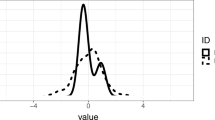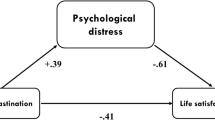Abstract
Procrastination, putting off until tomorrow what one had intended to do today, is a well-known phenomenon in everyday life. In an attempt to understand the character of procrastination, a large body of research has been accumulating over the last 40 years. The present study was to evaluate the need to distinguish between procrastination in different life-domains by gathering first hints as to whether procrastination is domain specific or domain general. In an online survey on 260 students (mean age = 23.56; SD = 3.74) the procrastination frequency in 6 different life-domains (academic and work, everyday routines and obligations, health, leisure, family and partnership, social contacts) was examined. Confirmatory factor analysis (CFA) and the analysis of mean-level differences revealed that procrastination is domain specific, but not extremely so. The results encourage further investigations into the domain specificity of procrastination and suggest that future diagnoses of and interventions for procrastination will profit from considering the life-domain procrastination occurs in.
Similar content being viewed by others
References
Akerlof, G. A. (1991). Procrastination and obedience. The American Economic Review, 81(2), 1–19.
Bong, M. (2001). Between and within-domain relations of academic motivation among middle and high school students: self-efficacy, task-value, and achievement goals. Journal of Educational Psychology. doi:10.1037/0022-0663.93.1.23.
Chu, A. H. C., & Choi, J. N. (2005). Rethinking procrastination: positive effects of “active” procrastination behavior on attitudes and performance. The Journal of Social Psychology, 145, 245–264.
Dewitte, S., & Lens, W. (2000). Exploring volitional problems in academic procrastinators. International Journal of Educational Research. doi:10.1016/S0883-0355(00)00047-1.
Dietz, F., Hofer, M., & Fries, S. (2007). Individual values, learning routines, and academic procrastination. British Journal of Educational Psychology. doi:10.1348/000709906X169076.
Duda, J. L., & Nicholls, J. G. (1992). Dimensions of academic motivation in schoolwork and sport. Journal of Educational Psychology. doi:10.1037/0022-0663.84.3.290.
Eccles, J. S., Wigfield, A., Harold, R., & Blumenfeld, P. (1993). Age and gender differences in children’s achievement self-perceptions during elementary school years. Child Development. doi:10.1111/1467-8624.ep9308115032.
Ferrari, J. R. (1992). Procrastination in the workplace: attributions for failure among individuals with similar behavioral tendencies. Personality and Individual Differences. doi:10.1016/0191-8869(92)90108-2.
Ferrari, J. R. (1993). Christmas and procrastination: explaining lack of diligence at a realworld task deadline. Personality and Individual Differences. doi:10.1016/0191-8869(93)90171-X.
Ferrari, J. R. (1998). Procrastination. In H. Friedman (Ed.), Encyclopedia of mental health (Vol. 3, pp. 281–287). San Diego: Academic.
Ferrari, J. R., & Scher, S. J. (2000). Toward an understanding of academic and nonacademic tasks procrastinated by students: the use of daily logs. Psychology in the Schools. doi:10.1002/1520-6807(200007).
Ferrari, J. R., Johnson, J. L., & McCown, W. G. (Eds.). (1995). Procrastination and task avoidance: Theory, research, and treatment. New York: Plenum Press.
Ferrari, J. R., Díaz-Morales, J. F., O’Callaghan, J., Díaz, K., & Argumedo, D. (2007). Frequent behavioral delay tendencies by adults: international prevalence rates of chronic procrastination. Journal of Cross-Cultural Psychology. doi:10.1177/0022022107302314.
Ferrari, J. R., Barnes, K. L., & Steel, P. (2009). Life regrets by avoidant and arousal procrastinators: why put off today what you will regret tomorrow? Journal of Individual Differences. doi:10.1027/1614-0001.30.3.163.
Glöckner-Rist, A., Engberding, M., Höcker, A., & Rist, F. (2009). Prokrastinationsfragebogen für Studierende (PfS) [Procrastination Scale for Students]. In A. Glöckner-Rist (Ed.), Zusammenstellung sozialwissenschaftlicher Items und Skalen [Summary of items and scales in social science]. ZIS Version 13.00. Bonn: GESIS.
Gröpel, P., & Kuhl, J. (2006). Having time for life activities. Life balance and self-regulation. Zeitschrift für Gesundheitspsychologie. doi:10.1026/0943-8149.14.2.54.
Hammer, C. A., & Ferrari, J. R. (2002). Differential incidence of procrastination between blues- and white-collar workers. Current Psychology. doi:10.1007/s12144-002-1022-y.
Harriot, J., & Ferrari, J. R. (1996). Prevalence of procrastination among sample of adults. Psychological Reports. doi:10.2466/pr0.1996.78.2.611.
Kasper, G. (2004). Tax procrastination: Survey finds 29% have yet to begin taxes. Retrieved from http://www.prweb.com/releases/2004/3/prweb114250.htm. March 30.
Lay, C. H., & Brokenshire, R. (1997). Conscientiousness, procrastination, and person-task characteristics in job searching by unemployed adults. Current Psychology. doi:10.1007/s12144-997-1017-9.
Lonergan, J. M., & Maher, K. J. (2000). The relationship between job characteristics and workplace procrastination as moderated by locus of control. Journal of Social Behavior and Personality, 15, 213–224.
Marsh, H. W. (1990). A multidimensional, hierarchical model of self-concept: theoretical and empirical justification. Educational Psychology Review, 2, 77–172.
Marsh, H. W., Balla, J. R., & Hau, K. T. (1996). An evaluation of incremental fit indices: A clarification of mathematical and empirical processes. In G. A. Marcoulides & R. E. Schumacker (Eds.), Advanced structural equation modeling techniques (pp. 315–353). Hillsdale: Erlbaum.
Martin, A. J. (2008). How domain specific is motivation and engagement across school, sport, and music? A substantive-methodological synergy assessing young sportspeople and musicians. Contemporary Educational Psychology. doi:10.1016/j.cedpsych.2008.01.002.
McDonald, R. P., & Marsh, H. W. (1990). Choosing a multivariate model: noncentrality and goodness-of-fit. Psychological Bulletin. doi:10.1037//0033-2909.107.2.247.
Milgram, N. A., Sroloff, B., & Rosenbaum, M. (1988). The procrastination of everyday life. Journal of Research in Personality. doi:10.1016/0092-6566(88)90015-3.
Milgram, N. A., Mey-Tal, G., & Levison, Y. (1998). Procrastination, generalized or specific, in college students and their parents. Personality and Individual Differences. doi:10.1016/S0191-8869(98)00044-0.
O’Donoghue, T., & Rabin, M. (1999). Procrastination in preparing for retirement. In H. Aaron (Ed.), Behavioral dimensions of retirement economics (pp. 125–156). Washington D.C. and New York: Brookings Institution Press and Russell Sage Foundation.
Pychyl, T. A., Lee, J. M., Thibodeau, R., & Blunt, A. (2000). Five days of emotion: an experience sampling study of undergraduate student procrastination. Journal of Social Behavior and Personality, 15, 239–254.
Rothblum, E. D., Solomon, L. J., & Murakami, J. (1986). Affective, cognitive, and behavioral differences between high and low procrastinators. Journal of Counseling Psychology. doi:10.1037/0022-0167.33.4.387.
Schouwenburg, H. C. (1995). Academic procrastination: Theoretical notions, measurement, and research. In J. R. Ferrari, J. L. Johnson, & W. G. McCown (Eds.), Procrastination and task avoidance: Theory, research, and treatment (pp. 71–96). New York: Plenum Press.
Schraw, G., Wadkins, T., & Olafson, L. (2007). Doing the things we do: A grounded theory of academic procrastination. Journal of Educational Psychology. doi:10.1037/0022-0663.99.1.12.
Senécal, C., & Guay, F. (2000). Procrastination in job seeking: an analysis of motivational processes and feelings of hopelessness. Journal of Social Behavior and Personality, 15, 267–282.
Shu, S. B., & Gneezy, A. (2010). Procrastination of enjoyable experiences. Journal of Marketing Research. doi:10.1509/jmkr.47.5.933.
Sirois, F. M. (2007). “I’ll look after my health, later”: a replication and extension of the procrastination—health model with community-dwelling adults. Personality and Individual Differences. doi:10.1037/0022-0663.95.1.179.
Sirois, F. M., Melia-Gordon, M. L., & Pychyl, T. A. (2003). “I’ll look after my health, later”: an investigation of procrastination and health. Personality and Individual Differences. doi:10.1016/j.paid.2006.11.003.
Solomon, L. J., & Rothblum, E. D. (1984). Academic procrastination: frequency and cognitive behavioral correlates. Journal of Counseling Psychology. doi:10.1037//0022-0167.31.4.503.
Spearman, C. (1904). “General intelligence”, objectively determined and measured. The American Journal of Psychology. doi:10.2307/1412107.
Stead, R., Shanahan, M. J., & Neufeld, R. W. J. (2010). “I’ll go the therapy, eventually”: procrastination, stress and mental health. Personality and Individual Differences. doi:10.1016/j.paid.2010.03.028.
Steel, P. (2007). The nature of procrastination: a meta-analytic and theoretical review of quintessential self-regulatory failure. Psychological Bulletin. doi:10.1037/0033-2909.133.1.65.
Steel, P. (2010). Arousal, avoidant and decisional procrastinators: do they exist? Personality and Individual Differences, 48, 926–934. doi:10.1016/j.paid.2010.02.025.
Tice, M., & Baumeister, R. F. (1997). Longitudinal study of procrastination, performance, stress, and health: the costs and benefits of dawdling. Psychological Science. doi:10.1111/j.1467-9280.1997.tb00460.x.
van Eerde, W. (2003). A meta-analytically derived nomological network of procrastination. Personality and Individual Differences. doi:10.1016/S0191-8869(02)00358-6.
Watson, D. C. (2001). Procrastination and the five-factor model: a facet level analysis. Personality and Individual Differences. doi:10.1016/S0191-8869(00)00019-2.
Wolters, C. A. (2003). Understanding procrastination from a self-regulated learning perspective. Journal of Educational Psychology. doi:10.1037/0022-0663.95.1.179.
Acknowledgments
I would like to thank Carola Grunschel for her insightful and helpful comments concerning an earlier version of this article and Laura Thau for her support in collecting the data.
Author information
Authors and Affiliations
Corresponding author
Rights and permissions
About this article
Cite this article
Klingsieck, K.B. Procrastination in Different Life-Domains: Is Procrastination Domain Specific?. Curr Psychol 32, 175–185 (2013). https://doi.org/10.1007/s12144-013-9171-8
Published:
Issue Date:
DOI: https://doi.org/10.1007/s12144-013-9171-8




